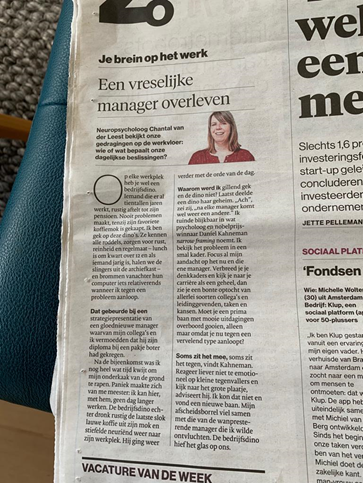Is your manager really as terrible as you think?
A few weeks ago I’ve cut this column out of the newspaper. The title is “Surviving a terrible manager”. I’ve stuck it to my fridge and it keeps staring at me whenever I’m in the kitchen. That’s when I decided to write a blog about exploring the possibility that your manager is not as terrible as you think he is. While writing I also wanted to put your mind to the problem we all face: Why is it so hard to talk about these topics and why would it actually work for the best if you did. The most effective way to fix issues with your manager is simply showing and telling them wat you feel or experience. This will create unexpected but beautiful situations, at least that is my experience as a business coach.
|
Working together is complicated, I can help you with this. |
In my previous blog I already mentioned this subject: In the west it’s “not done” to show our weaknesses. We want to show others how successful and strong we are and that we are in control of the situation. The consequence is that we fear to engage in deeper conversation with our managers, in which we discuss issues we have with their behaviour. You might feel that your manager might use this against you, that you show your cards. No, we’d rather carry the heavy load for a couple of months, feeling misunderstood or even invisible at work. This way you continue to perceive your manager as terrible, and you will crawl deeper into your shell.
Vulnerability, or in other words: “expressing what you need”
Putting yourself in a vulnerable position is not an expression of being “out of control”, but rather one of power. The way you position yourself makes the difference. Why would it be vulnerable or weak to talk about what you would like to change to avoid crashing? We assume others see what we feel or how we feel. Trust me: 9 out of 10 times this is not the case. Respect the other and yourself by openly discussing how you feel and how you got to that point.
Now this doesn’t mean you have to break down sobbing and put everything out there, but it would help to explain you feel angry, frustrated, tired, sad, insecure or bored. This removes the sharp edges. The next step is to explain why you feel this way, and most important how this can be fixed. Also which consequences these feelings have on your performance. For example, it keeps you awake at night, you check your work sixty times or you are afraid to give your opinion. Think about it: every leader or manager wants you to be as effective as possible, your performance to be as high as possible and your participation to be as involved as possible. Whatever stops your from achieving this, is what your manager would like to solve.
Empathic managers: needle in a haystack
In my experience managers don’t necessarily have a high score when it comes to empathy. Even though this competency is in the top two of most important quality’s for effective leadership. On the other hand does the job require certain skills to make quick and hard decisions, especially when it comes to reorganization and layoffs.
You can test your manager has a low score of empathy by the following indicators:
- Does your manager talk often and a lot?
- Does your manager use short and business like language?
- Does he listen less often and does he forget to ask further or summarize?
Is the answer to these questions yes? In that case you might want to be clear on what you want, how you feel and why you are in that state of mind. Help him to perform his responsibilities towards you. Stick to the I-message, write it down if this helps you. You can even practice with friends or colleagues. Just remember to avoid an accusing tone. Placing yourself into the others shoes will help both of you.
The dino doesn’t do bad at all!
In the picture above the writer realises that she quit her job to avoid working for her terrible boss. The effect was that she gave her manager even more power. Her older colleague (the dino of her team) didn’t worry too much about the small things, but rather the effect on the bigger picture. I would like to make a point out of this. Sometimes we give the other person a lot of power and in turn give them more responsibility and influence than they might actually have. How do you get a grip on this? What helps you to feel free and behave that way? Working in a team is hard, but I would like to help you maximize your own performance.
My mission in my job is to help people enjoy their jobs. That’s why I like to share my insights, knowledge and tips in both my practice and my projects for a big variety of organizations, but now also through my blogs.
Astrid Spanjaardt. No frill Coaching



